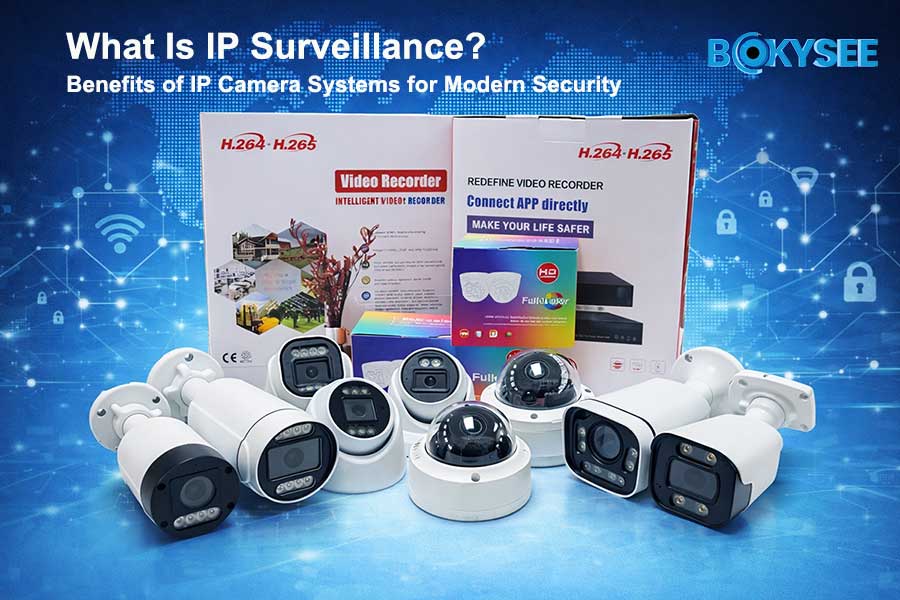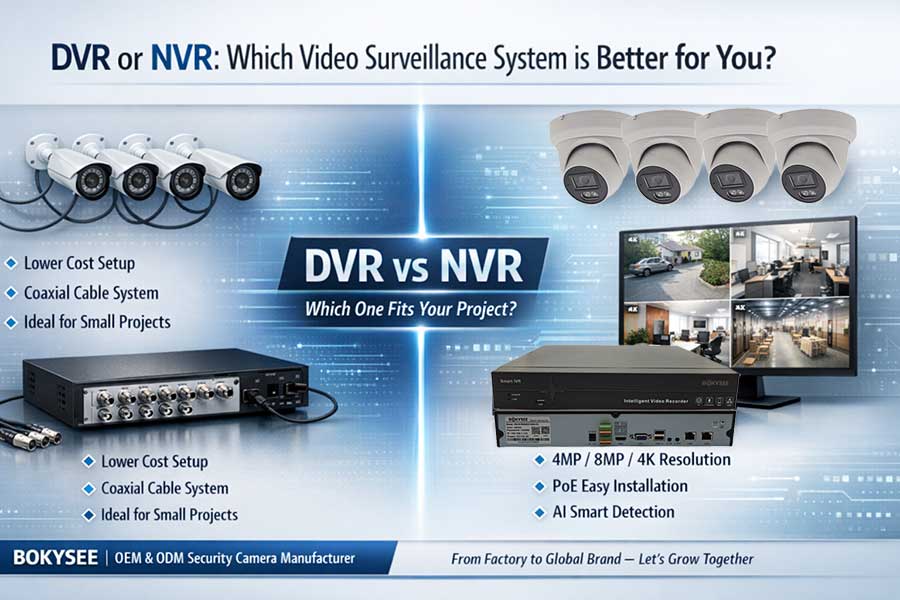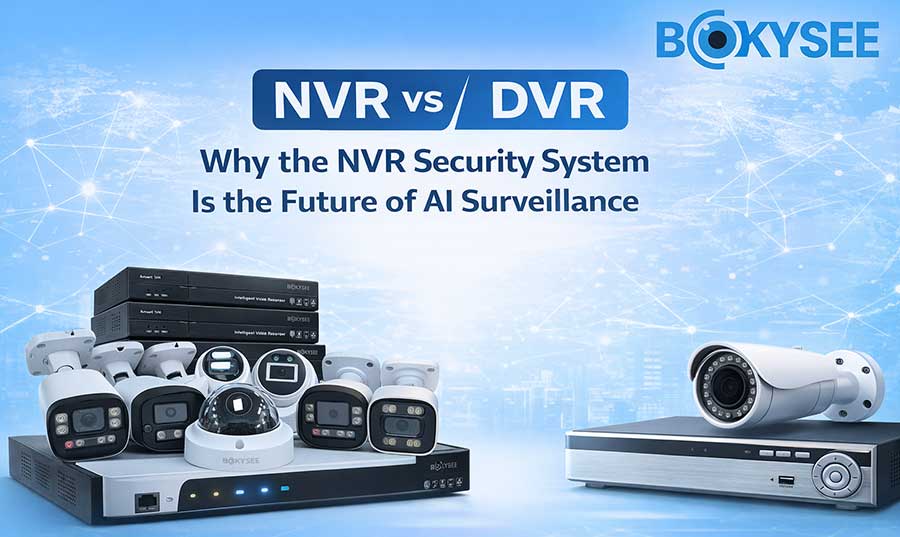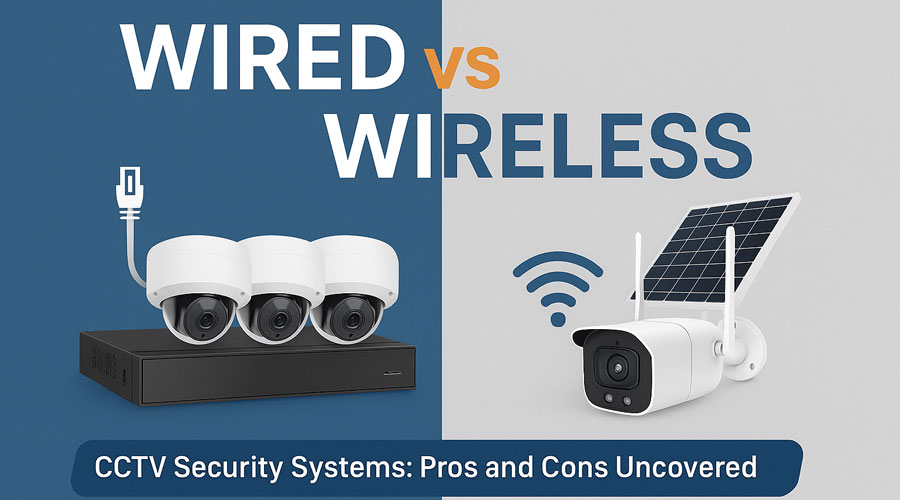
Системы видеонаблюдения стали неотъемлемой частью современной безопасности. Эти системы сдерживают преступность и предоставляют важные доказательства при возникновении инцидентов. Исследования показывают, что дома с системами видеонаблюдения 300% менее подвержены взлому. Споры между проводными и беспроводными системами безопасности усилились по мере развития технологий. Проводные камеры видеонаблюдения обеспечивают стабильность и высокое качество видеозаписи, в то время как беспроводные камеры безопасности обеспечивают гибкость и простую установку. В отличие от проводных систем видеонаблюдения, беспроводные системы полагаются на Wi-Fi или сотовые сети. Выбор правильной системы зависит от таких факторов, как стоимость, надежность и конкретные потребности в безопасности.
Overview of CCTV Security Camera Systems
Определение систем безопасности видеонаблюдения
Что такое проводные системы видеонаблюдения?
Проводные камеры видеонаблюдения используют физические кабели для передачи данных и питания. Эти кабели подключают камеры к сети или записывающему устройству, обеспечивая стабильную и бесперебойную запись видео. Кабели Ethernet обычно используются в проводных установках, предлагая высококачественный видеовыход без помех от внешних устройств. Предприятия и коммерческие объекты часто предпочитают проводные системы из-за их надежности и возможности бесшовной интеграции с профессиональными системами безопасности.
Wired security cameras provide consistent performance, making them ideal for long-term surveillance. Installation involves running cables to each camera, which can be time-consuming but ensures a dependable connection. Power over Ethernet (PoE) technology simplifies this process by combining data and power into a single cable. Advanced ePoE systems allow installations up to 800 meters away, making wired setups suitable for large spaces.
Что такое беспроводные системы видеонаблюдения?
Беспроводные камеры видеонаблюдения используют Wi-Fi или сотовые сети для передачи данных, устраняя необходимость в физических кабелях. Эти камеры обеспечивают гибкость в размещении, что делает их популярными для установок домашней безопасности. Беспроводным камерам безопасности требуются только источники питания, такие как батареи или шнуры питания, что упрощает установку. Домовладельцы часто выбирают беспроводные системы, чтобы избежать хлопот с прокладкой кабелей через стены или потолки.
Беспроводные камеры видеонаблюдения обеспечивают удаленный доступ, позволяя пользователям контролировать свою собственность через приложения для смартфонов. Эта функция особенно полезна для людей, которые часто путешествуют или которым нужно проверять записи видеонаблюдения, находясь вдали от дома. Однако беспроводные камеры могут сталкиваться с помехами сигнала из-за факторов окружающей среды или близлежащих устройств, таких как микроволновые печи. Надлежащие меры шифрования и кибербезопасности могут повысить безопасность беспроводных систем.
Основные различия между проводными и беспроводными системами
| KEY DIFFERENCES BETWEEN WIRED AND WIRELESS SYSTEMS | |
|---|---|
| WIRED | WIRELESS |
| • Physical cable connections | • Flexible data over Wi-Fi |
| • Stable, reliable signal | • Flexible and easy to install |
| • More difficult to install | • More prone to interference |
| • Ideal for larger properties | • Suitable for renters or smaller homes |
Соединение и передача сигнала
Проводные системы безопасности обеспечивают стабильное соединение через прямые кабельные соединения. Эта стабильность обеспечивает бесперебойную запись видеонаблюдения даже в средах с несколькими электронными устройствами. Проводные камеры менее подвержены помехам, что делает их надежными для мест, требующих постоянного наблюдения.
Беспроводные системы безопасности используют Wi-Fi или сотовые сети для передачи данных. Эти системы обеспечивают гибкость, но могут испытывать помехи сигнала от других устройств. Факторы окружающей среды также могут влиять на беспроводные соединения, потенциально влияя на качество видеоматериалов безопасности. Современные беспроводные камеры используют передовые технологии для минимизации этих сбоев, обеспечивая безопасную и надежную работу при правильной настройке.
Установка и настройка
Проводные системы требуют прокладки кабелей к каждой камере, что может быть трудоемким. Процесс установки включает прокладку кабелей через стены или потолки, что делает его более сложным, чем беспроводные установки. Технология PoE упрощает проводные установки, уменьшая количество необходимых кабелей, но процесс все еще требует тщательного планирования.
Беспроводные системы обеспечивают более простую установку, устраняя необходимость в обширной прокладке кабелей. Монтаж и питание камер являются основными шагами, что делает беспроводную настройку более быстрой и удобной. Беспроводные камеры безопасности идеально подходят для временных нужд наблюдения или ситуаций, когда гибкость имеет решающее значение. Модели с питанием от аккумуляторов требуют периодического обслуживания для замены или подзарядки аккумуляторов, в то время как подключаемые модели предлагают более постоянное решение.
Преимущества и недостатки проводных систем видеонаблюдения
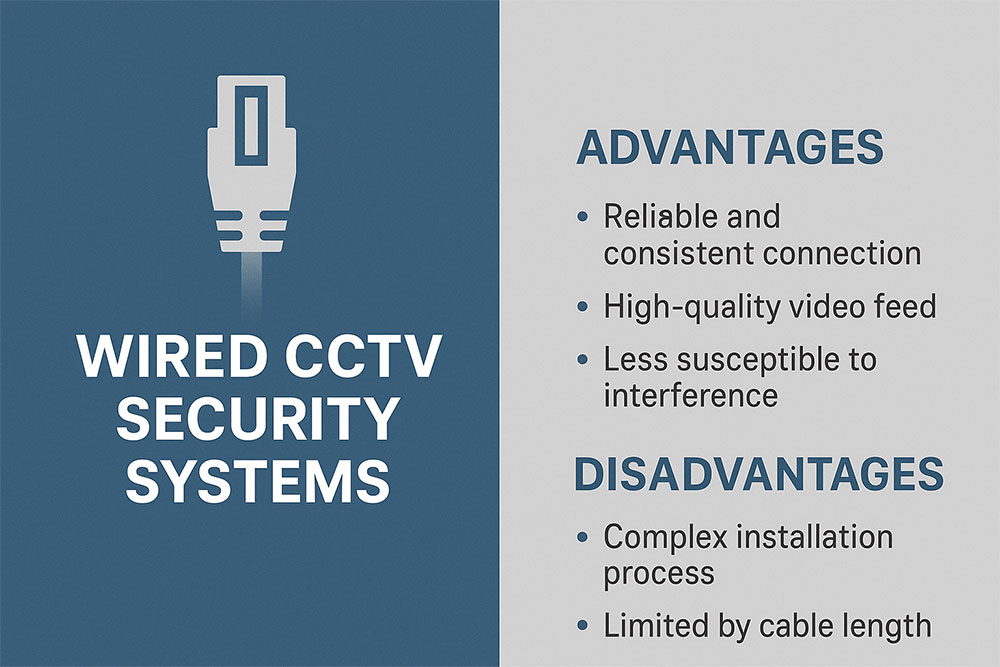
Преимущества проводных камер видеонаблюдения
Надежность и стабильность
Проводные камеры видеонаблюдения обеспечивают непревзойденную надежность для нужд видеонаблюдения. Физические кабели обеспечивают стабильное соединение, не подверженное помехам от других устройств или факторов окружающей среды. В отличие от беспроводных камер видеонаблюдения, проводные системы поддерживают постоянную производительность в любых условиях. Это делает их идеальными для мест, требующих непрерывного мониторинга, таких как предприятия или крупные объекты недвижимости.
The absence of signal disruptions enhances the dependability of wired CCTV cameras. Even in areas with heavy electronic activity, wired systems provide smooth and continuous footage. This reliability ensures that critical moments are captured without interruptions, offering peace of mind for users.
Передача видео высокого качества
Проводные камеры видеонаблюдения отлично справляются с передачей высококачественного видео. Прямое кабельное соединение исключает потерю данных во время передачи, обеспечивая четкие и подробные кадры. Эта функция имеет решающее значение для идентификации лиц, номерных знаков или других важных деталей на видеозаписях безопасности.
Использование передовых технологий, таких как Power over Ethernet (PoE), еще больше повышает качество видео. PoE упрощает настройку, объединяя питание и данные в одном кабеле, уменьшая беспорядок и сохраняя превосходную производительность. Проводные системы постоянно превосходят беспроводные камеры безопасности с точки зрения четкости видео, что делает их предпочтительным выбором для долгосрочного наблюдения.
Недостатки проводных камер видеонаблюдения
Сложность установки
Установка проводных камер видеонаблюдения часто требует значительных усилий. Этот процесс требует прокладки кабелей через стены, потолки или подземные каналы. Эта сложность может увеличить время и стоимость установки, особенно для крупных объектов.
Профессиональная помощь часто необходима для обеспечения правильной настройки. Хотя такие технологии, как PoE, упрощают установку, общий процесс остается трудоемким. Пользователи, ищущие быструю и беспроблемную настройку, могут посчитать беспроводные камеры безопасности более привлекательными из-за простоты установки.
Ограниченная гибкость
Проводные камеры безопасности не обладают гибкостью, которую предлагают беспроводные системы. Фиксированная природа кабелей ограничивает возможности размещения камер, ограничивая адаптируемость к меняющимся потребностям наблюдения. Перемещение проводных камер требует перенаправления кабелей, что может быть трудоемким и неудобным.
Это ограничение делает проводные системы менее подходящими для временных установок или сред, требующих частых корректировок. Беспроводные камеры безопасности с их беспроводным дизайном обеспечивают большую универсальность для пользователей, которые отдают приоритет гибкости в своих решениях по безопасности.
Advantages and Disadvantages of Wireless CCTV Security Camera Systems
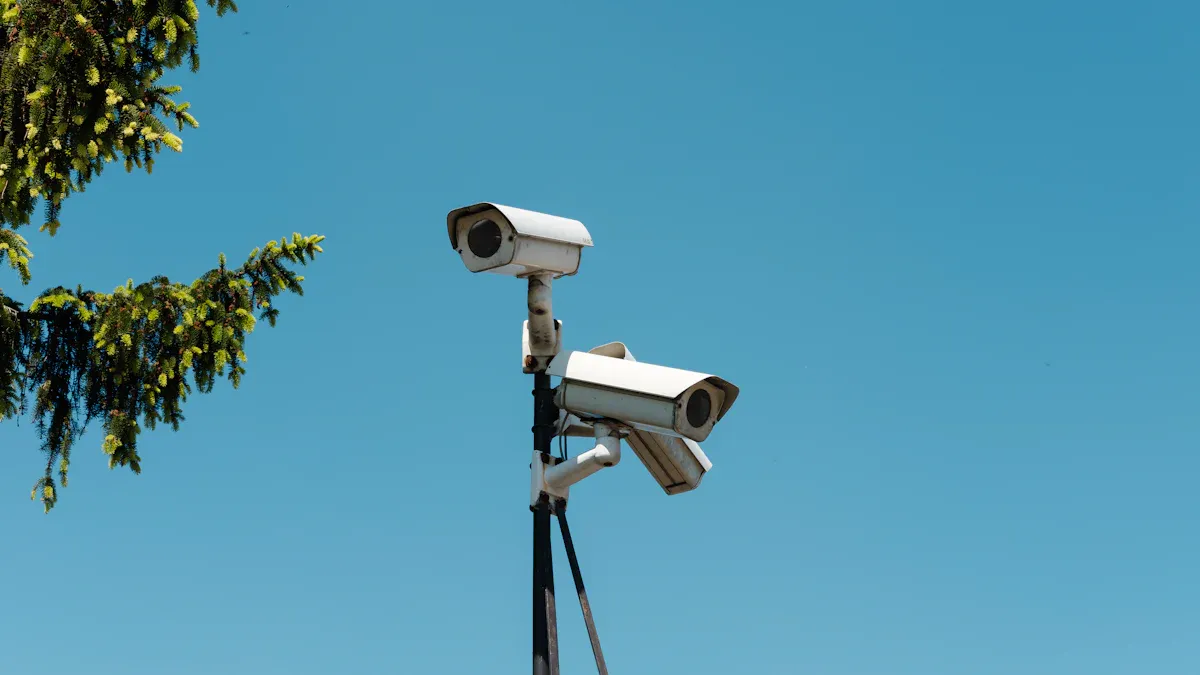
Преимущества беспроводных камер видеонаблюдения
Простая установка
Беспроводные камеры видеонаблюдения упрощают процесс установки. Монтаж и питание камер являются основными шагами, устраняя необходимость в обширной прокладке кабелей. Такая настройка экономит время и усилия, делая беспроводные варианты идеальными для быстрого развертывания. Домовладельцы часто предпочитают беспроводные камеры видеонаблюдения, чтобы избежать сверления отверстий или прокладки проводов через стены.
Battery-powered wireless cameras provide even greater convenience. These models require no connection to a power outlet, offering flexibility in placement. However, regular battery maintenance ensures uninterrupted operation. Plug-in wireless cameras offer a more permanent solution, combining ease of installation with a consistent power supply.
Удалённый доступ
Беспроводные камеры видеонаблюдения позволяют пользователям следить за своей собственностью практически из любой точки мира. Приложения для смартфонов и веб-платформы обеспечивают доступ в режиме реального времени к трансляциям и записанным кадрам. Эта функция особенно ценна для часто путешествующих или лиц, управляющих несколькими объектами недвижимости.
Расширенная технология шифрования повышает безопасность беспроводных систем. Правильная настройка защищает данные от несанкционированного доступа. Многие беспроводные камеры безопасности также поддерживают оповещения об обнаружении движения, отправляя мгновенные уведомления при возникновении необычной активности. Эта функция информирует пользователей и позволяет им быть проактивными в отношении их потребностей в безопасности.
Недостатки беспроводных камер видеонаблюдения
Помехи сигнала
Беспроводные камеры безопасности используют Wi-Fi или сотовые сети для передачи данных. Факторы окружающей среды и близлежащие электронные устройства могут нарушать сигналы. Микроволны, беспроводные телефоны и другие беспроводные устройства могут вызывать помехи, что приводит к снижению качества видео или временной потере соединения.
Современные беспроводные камеры видеонаблюдения используют передовые технологии для минимизации этих помех. Однако стабильность сигнала зависит от мощности сети и условий окружающей среды. Пользователи должны размещать камеры в пределах диапазона маршрутизатора и избегать их размещения вблизи потенциальных источников помех.
Зависимость от прочности сети
Беспроводные камеры видеонаблюдения полностью зависят от стабильного интернет-соединения. Слабые или непостоянные сетевые сигналы могут поставить под угрозу производительность. Видеопотоки могут отставать, зависать или не загружаться в периоды плохого соединения. Это ограничение делает беспроводные системы менее надежными в зонах со слабым покрытием Wi-Fi.
Переход на высокоскоростной интернет-план повышает производительность беспроводных камер безопасности. Инвестирование в ячеистую систему Wi-Fi расширяет покрытие, обеспечивая постоянное подключение на более крупных объектах. Несмотря на эти решения, проводные камеры видеонаблюдения остаются предпочтительным выбором для сред, требующих непрерывного наблюдения.
Сравнение проводных и беспроводных систем видеонаблюдения
| Comparison Factor | Проводные системы видеонаблюдения | Wireless CCTV Systems |
|---|---|---|
| Installation Cost | Higher upfront cost due to cabling and professional installation | Lower installation cost; minimal wiring required |
| Ongoing Costs | Minimal ongoing expenses | Cloud storage fees, battery replacements, possible internet upgrades |
| Обслуживание | Low maintenance after setup | Requires battery management and occasional troubleshooting |
| Стабильность сигнала | Stable, interference-free connection | May experience signal interference |
| Лучшее для | Large commercial properties, long-term surveillance | Homes, rental properties, temporary or flexible setups |
| Security Level | Higher resistance to hacking due to direct connection | Depends on WiFi security configuration |
Соображения стоимости
Стоимость играет важную роль при выборе между проводной и беспроводные камеры безопасности. Проводные системы часто требуют более высоких первоначальных расходов из-за сложности установки. Прокладка кабелей через стены или потолки требует профессиональной помощи, что увеличивает затраты на рабочую силу. Оборудование для проводные камеры видеонаблюдения, такие как сетевые видеорегистраторы (NVR) и коммутаторы Power over Ethernet (PoE), также увеличивают первоначальные инвестиции.
В отличие, беспроводные камеры безопасности Обычно имеют более низкие затраты на установку. Отсутствие обширной кабельной разводки снижает затраты на рабочую силу. Модели с питанием от аккумуляторов устраняют необходимость в розетках, что еще больше упрощает установку. Однако текущие расходы могут накапливаться для беспроводные системы. Плата за облачное хранилище и периодическая замена батареи могут увеличить долгосрочные расходы. Обновление интернет-планов для поддержки нескольких беспроводные камеры также может пополнить бюджет.
Техническое обслуживание и долговечность
Требования к техническому обслуживанию значительно различаются между проводной и беспроводные системы безопасности. Проводные камеры видеонаблюдения требуют минимального обслуживания после установки. Стабильное соединение, обеспечиваемое физическими кабелями, обеспечивает стабильную работу без частых регулировок. Долговечность проводные системы делает их пригодными для длительного использования в сложных условиях.
Беспроводные камеры видеонаблюдения, с другой стороны, требуют более частого обслуживания. Модели с питанием от аккумулятора нуждаются в регулярной подзарядке или замене для поддержания функциональности. Факторы окружающей среды, такие как экстремальные погодные условия, могут повлиять на долговечность беспроводные камеры. Помехи сигнала от близлежащих устройств также могут потребовать периодического устранения неполадок. Несмотря на эти проблемы, современные беспроводные системы внедрять передовые технологии для повышения надежности и снижения потребности в техническом обслуживании.
Лучшие варианты использования для каждой системы
Проводные системы для долгосрочного наблюдения
Проводные камеры видеонаблюдения преуспевают в сценариях, требующих стабильного и непрерывного наблюдения. Крупные коммерческие объекты, промышленные объекты и государственные учреждения выигрывают от надежности проводные системы безопасности. Прямое кабельное соединение обеспечивает высококачественную передачу видео без помех. Неограниченные возможности хранения, такие как локальные жесткие диски, делают проводные системы идеально подходит для сохранения большого количества отснятого материала с течением времени.
Прочная конструкция проводные камеры подходит для мест с интенсивной электронной активностью. Предприятия, приоритет которых — безопасность данных, предпочитают проводные системы из-за их устойчивости к попыткам взлома. Bokysee предлагает расширенные проводные системы видеонаблюдения, включая PTZ-камеры 4K Ultra HD и полные комплекты NVR, специально разработанные для долгосрочного видеонаблюдения.
Беспроводные системы для временных или гибких нужд
Беспроводные камеры видеонаблюдения обеспечивают непревзойденную гибкость для временных установок или динамических сред. Домовладельцы, ищущие быструю и беспроблемную установку, часто выбирают беспроводные системыМодели с питанием от аккумуляторов можно размещать в местах, где нет розеток, что делает их идеальными для наблюдения за строительными площадками или арендованной недвижимостью.
Удаленная доступность повышает привлекательность беспроводные камеры. Приложения для смартфонов позволяют осуществлять мониторинг в режиме реального времени, даже во время путешествий. Оповещения об обнаружении движения информируют пользователей о необычной активности. Камеры WiFi на солнечных батареях и интеллектуальные решения для видеонаблюдения с двумя объективами от Bokysee предлагают инновационные функции для гибких потребностей в области безопасности.
Рекомендации по продуктам для систем видеонаблюдения
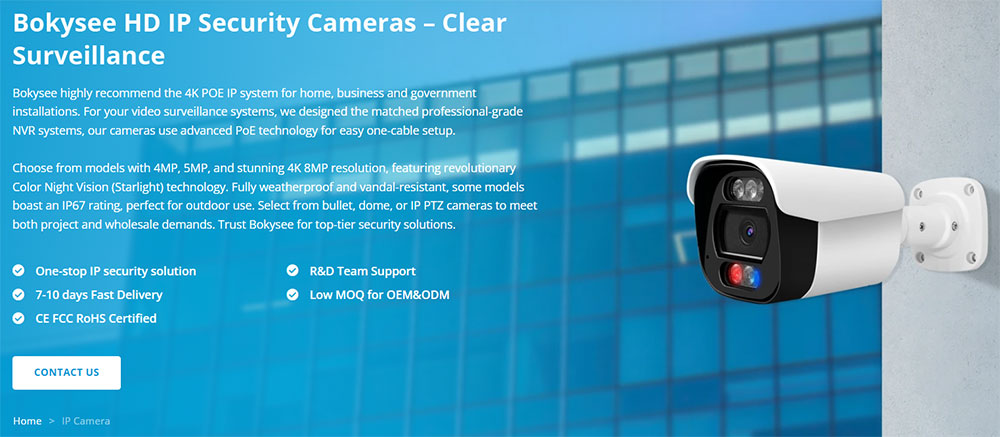
Рекомендуемые проводные системы видеонаблюдения
Особенности, на которые следует обратить внимание
При выборе проводные камеры видеонаблюдения, отдайте приоритет функциям, которые обеспечивают надежность и производительность. Высокое разрешение записи необходимо для захвата четких и подробных кадров. Ищите системы с разрешением 4K Ultra HD, так как это обеспечивает исключительную четкость для идентификации лиц или номерных знаков. Прочная конструкция с устойчивостью к погодным условиям, например, оборудование с классом защиты IP67, обеспечивает долгосрочное использование на открытом воздухе.
Технология Power over Ethernet (PoE) упрощает установку, объединяя питание и данные в одном кабеле. Эта функция уменьшает беспорядок и повышает эффективность системы. Возможности интеллектуального обнаружения движения добавляют ценность, предупреждая пользователей о необычной активности. Функция ночного видения — еще одна важная функция, обеспечивающая непрерывный мониторинг даже в условиях низкой освещенности.
Пример: проводная система Bokysee
The Проводная система видеонаблюдения Bokysee обеспечивает непревзойденную надежность и расширенные функции. Эта система включает в себя 4K Ultra HD PTZ-камеры, которые обеспечивают точное управление и высококачественный видеовыход. Полный комплект NVR обеспечивает бесшовную интеграцию и хранение отснятого материала. Предприятия и крупные объекты получают выгоду от стабильности системы и ее способности справляться с высокими требованиями к безопасности.
Для использования на открытом воздухе, Системы ночной безопасности Lorex выделяются своим цветным ночным видением и интеллектуальным обнаружением движения. Эти камеры обеспечивают защиту от непогоды IP67, что делает их идеальными для суровых условий. Сочетание передовых технологий и прочной конструкции делает эти системы лучшим выбором для долгосрочного наблюдения.
Рекомендуемые беспроводные системы видеонаблюдения
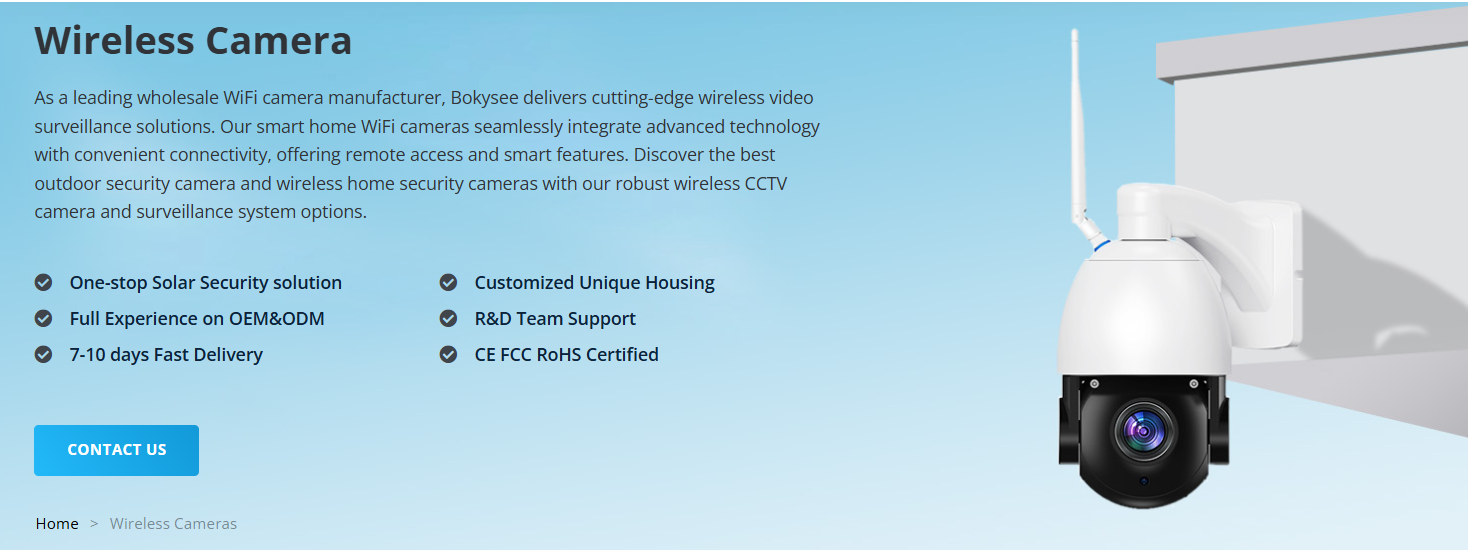
Особенности, на которые следует обратить внимание
Гибкость и удобство определяют лучшее беспроводные камеры безопасности. Выбирайте модели с возможностью удаленного доступа, позволяющие осуществлять мониторинг в реальном времени через приложения для смартфонов. Высокое качество видео, например 16 МП или выше, обеспечивает детальную съемку. Широкое поле зрения, например панорамный объектив на 180 градусов, обеспечивает максимальный охват без необходимости использования нескольких камер.
Интеллектуальное обнаружение движения повышает безопасность, отправляя мгновенные оповещения при возникновении активности. Варианты с питанием от батареи обеспечивают универсальность для зон без розеток, а модели с питанием от солнечной батареи сокращают потребность в обслуживании. Расширенное шифрование защищает данные от несанкционированного доступа, обеспечивая безопасную работу.
Пример: беспроводная система Bokysee
The Беспроводная система видеонаблюдения Bokysee сочетает в себе инновации и практичность. Камеры WiFi на солнечных батареях обеспечивают экологически чистые решения для гибкого наблюдения. Интеллектуальные камеры с двумя объективами обеспечивают обзор на 180 градусов, сокращая слепые зоны. Удаленный доступ через удобные приложения позволяет пользователям контролировать объекты из любой точки мира.
The Reolink Duo 3 WiFi предлагает впечатляющие функции, включая разрешение 16 Мп и цветное ночное видение. Интеллектуальное обнаружение движения этой камеры обеспечивает надежные оповещения о безопасности. Для проводной стабильности с беспроводным удобством, Reolink Duo 3 PoE provides a seamless 180-degree panoramic view and ultra-high-definition recording. Both options suit residential and commercial applications, delivering exceptional performance.
Факторы принятия решения при выборе систем видеонаблюдения
Тип и размер недвижимости
Размер и планировка объекта играют решающую роль при выборе камер видеонаблюдения. Крупные объекты, такие как промышленные объекты или обширные коммерческие помещения, часто выигрывают от проводных систем безопасности. Стабильное подключение проводных камер обеспечивает бесперебойное наблюдение на обширных территориях. Для небольших домов или арендованных объектов беспроводные камеры безопасности обеспечивают гибкость и простоту установки. Беспроводные настройки позволяют быстро корректировать размещение камеры без хлопот с прокладкой кабелей.
Многоэтажные здания или объекты со сложной планировкой требуют тщательного рассмотрения. Проводные камеры видеонаблюдения отлично обеспечивают стабильное качество видео в таких условиях. Беспроводные камеры могут сталкиваться с перебоями сигнала в зонах с толстыми стенами или множественными препятствиями. Системы Mesh WiFi могут помочь расширить покрытие для беспроводных установок в более крупных объектах.
Бюджет и расходы
Бюджетные ограничения часто влияют на решения относительно систем видеонаблюдения. Проводные камеры безопасности обычно требуют более высоких первоначальных затрат из-за сложности установки. Профессиональная помощь в прокладке кабелей и настройке оборудования увеличивает расходы. Однако проводные системы требуют меньшего обслуживания с течением времени, что делает их экономически эффективными для долгосрочного использования.
Беспроводные камеры безопасности обычно имеют более низкие первоначальные затраты. Отсутствие обширной кабельной разводки снижает затраты на рабочую силу. Модели с питанием от аккумуляторов устраняют необходимость в розетках, что еще больше снижает затраты на установку. Текущие расходы, такие как плата за облачное хранилище или замена аккумуляторов, могут увеличить общие инвестиции в беспроводные системы. Обновление интернет-планов для поддержки нескольких камер также может повлиять на бюджет.
Безопасность и надежность данных
Безопасность данных остается главным приоритетом для пользователей камер видеонаблюдения. Проводные системы безопасности обеспечивают безопасное соединение, которое менее уязвимо для попыток взлома. Прямая кабельная связь обеспечивает передачу данных без воздействия внешних сетей. По этой причине предприятия и государственные учреждения часто предпочитают проводные установки.
Беспроводные камеры безопасности используют WiFi или сотовые сети, которые могут представлять риски для кибербезопасности. Правильное шифрование и настройка снижают уязвимости и защищают данные от несанкционированного доступа. Надежность сигнала также влияет на производительность беспроводных систем. Слабые сетевые соединения могут привести к задержкам или прерываниям видеопотоков. Инвестиции в высокоскоростной Интернет и расширенное шифрование повышают надежность беспроводных камер безопасности.
A recent survey revealed that 46% of Americans consider high local crime rates when purchasing security systems. This highlights the importance of choosing reliable solutions for safeguarding properties. Бокизее предлагает как проводные, так и беспроводные системы видеонаблюдения, разработанные для удовлетворения различных потребностей. Такие продукты, как 4K Ultra HD PTZ-камеры и камеры WiFi на солнечных батареях, предлагают инновационные функции для повышения безопасности.
CCTV Security Systems play a vital role in safeguarding properties. Choosing between wired and беспроводные камеры depends on specific needs and preferences. Wired CCTV cameras offer unmatched reliability and stability for long-term surveillance. Wireless security cameras provide flexibility and easy installation, making them ideal for temporary setups. Evaluating factors like cost, area size, and system capabilities ensures the right choice. Features such as high-resolution video, night vision, and remote access enhance overall security. Бокизее предлагает передовые проводные и беспроводные решения, предлагая надежные варианты обеспечения безопасности жилых, коммерческих и промышленных объектов.
Смотрите также
Выбор между аналоговыми и IP-камерами безопасности для вас
Лучшие беспроводные камеры безопасности для дома, которые стоит рассмотреть в 2024 году
Будущее наблюдения: камеры видеонаблюдения с искусственным интеллектом против традиционных систем
Как выбрать правильного производителя систем видеонаблюдения для обеспечения безопасности дома
Чем выделяется система беспроводной камеры видеонаблюдения Bokysee 4K

